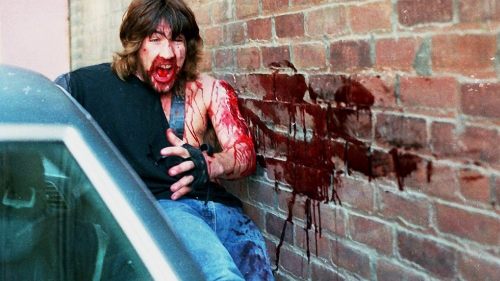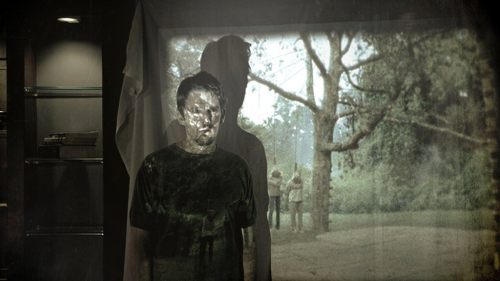The Savage Stack - UNCLE SAM (1996)
There’s always going to be – for lack of a better term – a stack of films we’ve been meaning to get to. Whether it’s a pile of DVDs and Blu-rays haphazardly amassed atop our television stands, or a seemingly endless digital queue on our respective streaming accounts, there’s simply more movies than time to watch them. This column is here to make that problem worse. Ostensibly an extension of Everybody’s Into Weirdness (may that series rest in peace), The Savage Stack is a compilation of the odd and magnificent motion pictures you probably should be watching instead of popping in The Avengers for the 2,000th time. Not that there’s anything wrong with filmic “comfort food” (God knows we all have titles we frequently return to when we crave that warm and fuzzy feeling), but if you love movies, you should never stop searching for the next title that’s going to make your “To Watch” list that much more insurmountable. Some will be favorites, others oddities, with esoteric eccentricities thrown in for good measure. All in all, a mountain of movies to conquer.
The next few entries (seventy-eight through eighty-one) are going to be a somewhat modified iteration of the Savage Stack. In two weeks, it's Fantastic Fest 2018! To celebrate, I wanted to pen a string of articles celebrating the filmography of Bill Lustig, whose landmark slasher Maniac is being presented via its new 4K restoration. So, I'm counting backwards to 1980 with some of my favorite works from the grindhouse king.
The initial installment covers his '96 reunion with Maniac Cop screenwriter Larry Cohen for the cartoonishly violent Eurohorror takedown of Main Street, USA, Uncle Sam...

By ‘96, both Bill Lustig and Larry Cohen weren't directing that many movies. Lustig's last picture – the Hammer Films influenced capper to the Maniac Cop trilogy, Badge of Silence ('93) – had blown up in his face. Overseas Filmgroup had obtained the rights to the franchise while Lustig was attempting to get other projects off the ground, and his vision for the third MC picture was supposed to deliver his Bride of Frankenstein ('35), showcasing a black lead instead of series regular Robert Davi. The financiers pulled out at the last minute (due to the character's race), and Davi reprised his role as Detective McKinney. Unfortunately, the script Larry Cohen (The Stuff ['85]) – who penned all three installments – originally wrote for the movie was now worthless, and every new producer who signed on wanted to "piss in the pot" (as Lustig has so succinctly put it in the past).
In fact, Cohen never turned in a script to replace his original story idea, and Lustig only ended up shooting fifty-one minutes of film before quitting and being replaced by producer Joel Soisson, who only wanted to complete the movie so that the moneymen would have a product to hock. While all theatrical prints of Maniac Cop 3 were released with Lustig's name credited as director, the Blue Underground preservationist has ensured that all home video releases from this point forward contain the nom de failure, Alan Smithee. Nevertheless, the third MC entry is still insanely entertaining, mostly thanks to Lustig's refusal to focus on any sort of narrative arc, and future Fast & The Furious stunt coordinator Spiro Razatos' relentless need to leave behind any standards of safety.
Meanwhile, Cohen's own directorial output had been mostly relegated to the DTV market. The subversive lo-fi maestro – whose work traversed the genre gamut from Blaxploitation staple Black Caesar ('73) to the "Harryhausen over SoHo" monster mash Q: The Winged Serpent ('82) – had run out of juice in terms of getting his movies into auditoriums. As Cohen himself told me when we spoke about his lengthy career a few months back:
"...every time I made a picture, they wanted to put it out on DVD instead of a theatrical run because theatrical was considered a big gamble. The studios were spending $20 - $25,000,000 to advertise a movie, so the smaller pictures I was making couldn't play in that poker game anymore. The stakes were just too high. I just said, 'well I'm not going to make these movies then' because I didn't want people to just see them on DVD. I wanted them to see them in theaters, because that's where they belong."
Perhaps fittingly, both Cohen and Lustig both directed their last proper features in '96, with the legendary screenwriter calling Jim Brown, Fred Williamson and Pam Grier back into action for the Blaxplo revival Original Gangstas. Almost simultaneously, Lustig produced Uncle Sam, a DTV slasher based on one of Larry's scripts that acts as a strange companion piece to the original Maniac Cop ('88). Only instead of taking down the blue code of silence constructed by the NYPD, it attacks America's self-appointed role as "world police", cartoonishly skewering the notion that the US of A is even remotely the "greatest country in the world".
We begin in Kuwait – where American troops are still stationed in the Middle East – and a gruff Major (mustache-sporting exploitation staple William Smith) stumbles upon a helicopter that's been shot down via friendly fire. Before he can cover up the heinous act perpetrated by his own men, lone, crispy semi-survivor Sam Harper (David Shark Fralick) shoots him and another soldier who arrives on scene, before quickly expiring. Smash Cut To: Twin Rivers, USA – a finely manicured slice of Americana pulled straight out of a Sears catalog – where Sam's nephew Jody (Christopher Ogden) pines for his favorite uncle to return home after being gone for three years, while his mother (Leslie Neale) and aunt (Anne Tremko) secretly wish the only way that drunken, abusive piece of shit ever comes back to the States is in a box.
In Lustig and Cohen's vision of America, there are no "heroes", only stupid boys who signed up to go overseas so that they can serve their country, or legally kill people because they enjoy it. Sam fell into the latter category - a full-tilt psycho whose chaotic reign of death still haunts his only living platoon buddy Jed (Truck Turner himself, Isaac Hayes) to this day. Jed is essentially the Dr. Loomis of Uncle Sam – a one-legged vet distrustful of the government because he knows what its army can do to men's minds – practically screaming at children to never want to grow up to be a soldier, because not only will war destroy what little innocence they possess, the very concept of combat isn't what it used to be. The enemy is no longer defined by their evil deeds, but rather how sharks in suits think can paint the “bad guys” as a means to boost their bottom lines. So, as long as men like Sam are stuck overseas, the good people back home are a whole lot safer.
Naturally, when a Sergeant in full uniform (Bo Hopkins) arrives back to Twin Rivers with news of Sam's death – not to mention the killer's body in tow – we all know it's only a matter of time before the beast rises from the grave and starts enacting bloody violence on the "unpatriotic" subsection of his hometown (which is surprisingly quite large). Teenage flag burners, draft-dodging schoolteachers, and even the Sergeant himself (due to his philandering nature) become targets for the red, white and blue Jason Voorhees' wrath, as he strangles, hangs, hacks, and buries the ungrateful alive. The only ones who seem to be safe are Jody and poor, blind Barry Cronin (Zachary McLemore), who's wheeled around in a rickety chair like a 'Nam refugee, thanks to a freak fireworks accident.
Cohen has long maintained that he’s never intended to make "message movies", but Uncle Sam's silly, ham-fisted commentary seems to come first, with bloody splatter second. Thankfully, Lustig shoots it all with foggy Eurohorror flair (to go along with the movie's dedication: "For Lucio"), and stages the gore gags – such as a cop being impaled on an American flag's pole – with gnarly aplomb. Academy Award-winning editor (and Grindhouse Releasing co-founder) Bob Murawski cuts it all together with a flow that's far more refined than your average DTV title. For the literal cannon-firing climax, Razatos returns to blow up an entire house and light walking corpses on fire, bringing a bit of the action/horror majesty he perfected with Maniac Cop 2 ('90) to this July 4th BBQ.
So, while it's certainly a shame that neither Lustig nor Cohen have helmed another feature since, Uncle Sam still stands as a splendidly trashy send-off for the two, gathering some of their greatest collaborators all in one place. While Cohen has continued to churn out screenplays for top dollar, Lustig became a sort of cinema savior in another way, using his Blue Underground label to restore and preserve many of the 42nd Street exploitation titles that fascinated him as a teenager in Times Square. In a way, Uncle Sam doubles as a fitting period at the end of Cohen and Lustig's collective sentence, marking a stopping point of a distinct period in American genre filmmaking history.
Uncle Sam is available now on Blu-ray, courtesy of Blue Underground. And if you haven't snagged a badge for Fantastic Fest, you should totally do so here!



